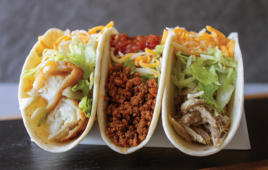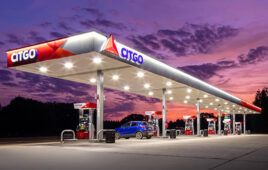Delek US Holdings Inc., a diversified energy company with assets in the petroleum refining, marketing and retail industries, announced its financial results for the first quarter of 2010.
For the three months ended March 31, 2010, Delek US reported a net loss from continuing operations of $14.1 million, or ($0.26) per basic share, versus a net loss from continuing operations of $1.4 million, or ($0.03) per basic share, in the first quarter 2009. Excluding special items, the company reported an adjusted net loss from continuing operations of $14.0 million, or ($0.26) per basic share, in the first quarter 2010, versus an adjusted net loss of $2.4 million, or ($0.05) per basic share, in the first quarter 2009.
“Our first quarter results were adversely impacted by a combination of severe winter weather in several of our core retail markets during January and February, in addition to weak Gulf Coast refining economics which persisted for most of the quarter,” noted Uzi Yemin, president and CEO of Delek US. He added, “Within our retail segment, same-store merchandise sales improved for the third consecutive quarter during the first quarter 2010, due in part to increased contributions from our reimaged store locations open more than one year. A slight decline in our same-store fuel gallons sold was offset by an increase in our first quarter retail fuel margin, when compared to the year-ago period.”
As of March 31, 2010, Delek US had $40.3 million in cash and $313.5 million in debt, resulting in a net debt position of $273.2 million. During the first quarter 2010, Delek US applied taxable losses generated in 2009 against taxes paid in prior years, resulting in a net operating loss carryback. Consequently, the Company received a federal tax refund of nearly $40 million cash during the second quarter 2010, which should serve to enhance the Company’s liquidity position.
“As a management team, we remain focused on a return to profitable growth and continued balance sheet discipline. From a liquidity perspective, we remain well-positioned to reinvest in strategic growth initiatives that further our plan for long-term value creation,” said Yemin. “Entering the second quarter, we have experienced increased demand for refined products sold in our refining, retail and marketing segments. This uplift in demand is primarily attributable to a combination of favorable seasonal trends and improving economic conditions in our regional markets.”
The refining segment operated for 90 days during the first quarter 2010. The refinery was not in operation during the first quarter 2009 due to a fire at the Tyler refinery on Nov. 20, 2008.
Refining contribution margin was $2.5 million in the first quarter 2010, versus $14.6 million in the first quarter 2009. During the first quarter 2009, the Delek recorded $1.6 million of income on property damage insurance claims, net of expense, and $21.1 million of income on business interruption insurance claims related to the November 2008 fire. Delek did not receive any such insurance proceeds in the first quarter 2010.
Gulf Coast refining economics remained challenging for most of the first quarter 2010. The benchmark 5-3-2 Gulf Coast crack spread declined more than 25% to $6.62 per barrel in the period, versus $9.14 per barrel in the first quarter 2009. In addition, the price of West Texas Intermediate crude, the Tyler refinery’s primary feedstock, increased more than 80% between the first quarter 2009 and the first quarter 2010.
Capacity utilization at the Tyler refinery was 81.7% in the first quarter 2010, versus 76.6% in the fourth quarter 2009. Tyler produced an average of 53,580 barrels per day in the first quarter 2010, versus an average of 50,189 in the fourth quarter 2009. Direct operating expense per barrel sold was $5.14 per barrel in the first quarter 2010, versus $5.73 per barrel in the fourth quarter 2009.
Refining margin, adding back inter-company product marketing fees of $0.53 per barrel, was $6.24 per barrel sold in the first quarter 2010, compared to $3.91 per barrel sold in the fourth quarter 2009.
Retail segment contribution margin was $7.4 million in the first quarter 2010, compared to $7.3 million in the first quarter 2009. An increase in the company’s retail fuel margin offset a slight decline in same-store fuel gallons sold and merchandise margin, when compared to year-ago levels.
Same-store merchandise sales increased 1.2% in the first quarter 2010, compared to a same-store decline of 4.4% in the first quarter 2009. The improvement in same-store merchandise sales was favorably impacted by strong contributions from the company’s “reimaged” MAPCO store locations, in addition to a general improvement in the Company’s fresh food service programs. Merchandise margin declined to 30.8% in the first quarter 2010, versus 32.0% in the prior year period, due to margin compression within the company’s cigarette and dairy categories.
Same-store fuel gallons sold declined by 0.3% in the first quarter 2010, compared to a same-store sales decline of 2.2% in first quarter 2009. The retail segment sold a total of 103.0 million gallons during the three months ended Mar. 31, 2010, versus 106.7 million gallons in the prior year period. The company’s retail fuel margin was 12.9 cents per gallon in the first quarter 2010, compared to 11.2 cents per gallon in the prior year period.
Marketing segment contribution margin increased to $5.8 million in the first quarter 2010, compared to $5.0 million in the first quarter 2009. Marketing contribution margin benefited from fees earned through the Company’s crude logistics operations during the first quarter 2010.
Inventory levels remained at normalized levels during the first quarter, while wholesale product prices in West Texas moved closer to parity, leading to more rational pricing in the period.
Total sales volumes within the marketing segment increased 7.2% to 14,298 barrels per day in the first quarter 2010, compared to 13,342 barrels per day in the prior-year period.




